#wick meta
Text
I realized that the updated Tag Search function makes it way easier to attempt to parallel search relationships including a specific character.
This method works better for characters who are not glitter and shipped with every person and creature and object under the sun.
This tutorial is written for people not familiar with tag ids. If you know how tag ids work, you should read the last two paragraph of this tutorial first.
You can find the Tag Search by looking at the menu at the top of the AO3 page that’s off to the left side.
Click Search and click Tag (the third option from the top).

Type in your character. If the character only ever appears in one fandom, you also include that. If the character you want to search as a very common name, you will probably have to include a fandom to avoid pulling in unrelated tags. Do not include more than one fandom otherwise the result will only pull up any tags that exist in all the fandoms you listed.
Select Relationship for type
Select Canonical
Hit Search Tags

The results should pull up every relationship that includes that character for that specific fandom or if you did not restrict by fandom, every relationship that has character with an identical name to the character you’re searching for.
For the character I picked, “Arm”, there are 29 results.
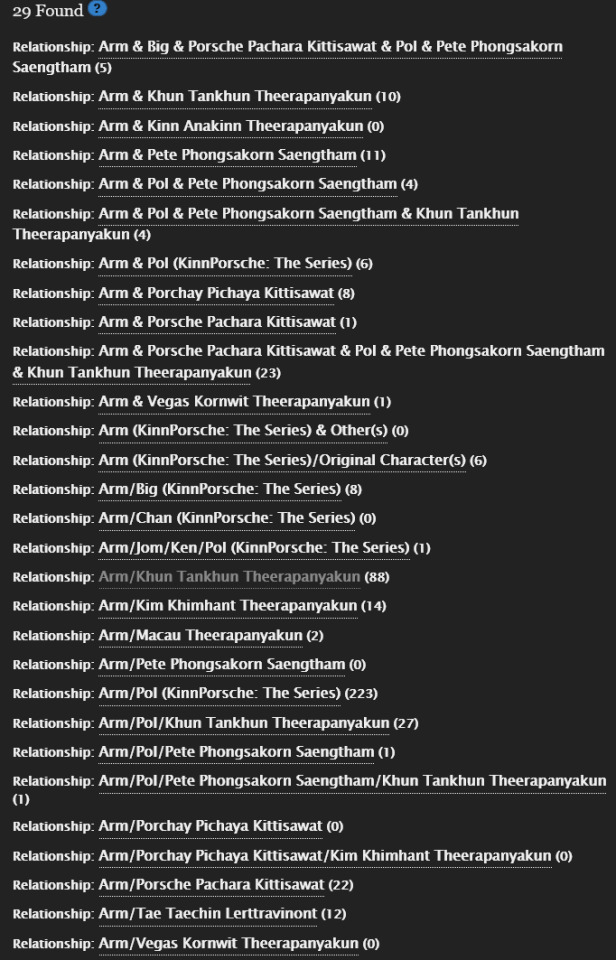
Open the Work Search page in a new tab or window. You can find a link in the same menu as Tag Search.

Or you can also open it through button labeled Work Search beside the Tag Search heading.

On the Work Search page, find the Any Field box.
This next part will be time-consuming but you will need to format all the relationships you want to parallel search like this: "X/Y" OR "X & A" OR "B & Z".
The tags need to match how they were shown on the Tag Search page. Each relationship needs to be placed between straight quotes. Curly quotes will break this search. Between each relationship tag, there needs to be an OR in all caps, but not one at the start or end.
After you’ve formatted things like this you can paste it into the Any Field box. (You could have just composed your search in there but if you’re parallel searching many relationship tags, doing it in notepad or something may make it easier to see what you’ve already included.)
There are filter options on this page. If you want to sort by completed or such, this is the point you need to do it at this point. This kind of search does not allow you to filter after you have clicked search. Unlike filtering on a specific tag, there is no filtering sidebar. A few other caveats:
If you want to exclude tags, you will have to input them into the Any Field box alongside the relationship tags. Those excluded tags will need to be formatted like such: - "tag 1" - "tag 2"
Basically they just need a minus sign in front of them. You do not need to include OR between them.
If you include more than one tag in the Character, Relationship, or Additional Tag boxes, the search will only bring up results that match all of your search parameters. So if you inputted “Fluff” and “High School” into the Additional Tag field, it would only bring up works that have both the “Fluff” and “High School” tag as well as any of the relationship tags in the Any Field.

I just want search for every work that includes Arm so I have no other filtering added. It looks like something below.

Once you’ve finished setting up your search, click the search button.
In the case of my search, I only set it up to pull up any of the 29 relationship tags I found that included Arm. When I saved this screenshot, there were 412 results.

A few important things to note. While AO3 doesn’t really restrict how many text characters you put into the Any Field box, most browsers have a limit. So if you want to parallel search a lot of relationship or any tags in fact, you may run into your browser breaking your search.
If you’re searching a high number of tags, it’s better to use tag ids instead because they’re shorter and so you’ll be able to include way more information with less text characters. The tutorial works similarly except the list will be formatted like such: filter_ids:123 OR filter_id:456
You will not need to put quotes around a tag id. To find a tag id, you can open a specific tag and look at its RSS Feed, or by using the following script: https://greasyfork.org/en/scripts/29917-ao3-display-tag-id
#AO3#archiveofourown#Tutorial#should I also just recreate this tutorial with tag ids?#wick meta#I cannot find the readmore function anymore so sorry everyone
527 notes
·
View notes
Text
there's something to be said about wicked's opening and closing numbers both ending with a high cry of "WICKED" and while at the start of the show glinda is singing it with the ensemble, at the end she's silent on that final word. she's said her piece, she's told them the story and they're still crying out that elphaba is wicked, and this time glinda can't bring herself to join, too hurt to keep pretending.
instead, the last thing she sings is a reprise of for good, showing just how much elphaba did change her. she's not willing to join the crowds anymore.
also by not having glinda sing the last words, the narrative further isolates her from the rest of the world. she's truly and utterly alone.
#is this anything#does this make sense. i feel insane about glinda tbh#gelphie#wicked#wicked musical#glinda upland#wicked meta
1K notes
·
View notes
Text
Mizu’s Fighting Style: Season 1 VS Season 2
Season 1: Kill Bill katana era.
Season 2: John Wick gun era.
#mark my words#blue eye samurai#mizu#mizu blue eye samurai#bes mizu#mizu bes#bes spoilers#blue eye samurai spoilers#blue eye samurai memes#blue eye samurai meta#abijah fowler#bes season 2#blue eye samurai season 2#bes headcanons#blue eye samurai headcanons#blue eye samurai theory#kill bill#john wick#revenge trope
142 notes
·
View notes
Text
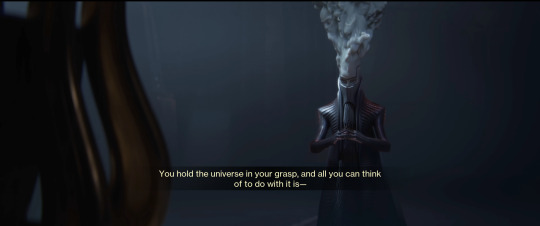
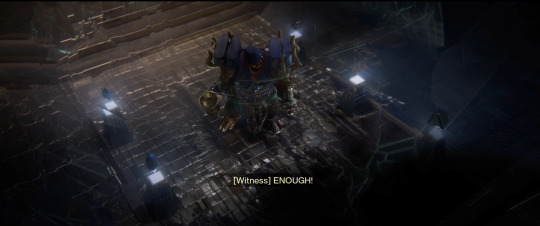
This bit keeps sticking with me, when it comes after the Witness's "We know pain. Our purpose is its end," which comes after Rohan's "Pain reminds us that we're alive, that we're still fighting." Lightfall starts off with the Witness being this unstoppable, untouchable force, that unmakes Ghosts and Guardians with a literal flick of its wrist. And then the rest of the expansion sets up why it just kind of sucks at what it's pretending to be.
Osiris defines the Light as being the physical, and doesn't just link the Darkness with the immaterial—he links it with thought, memory, emotion, soul. The Witness is a being of Darkness, and Darkness is the nature of being alive. Darkness is emotion, fear is Darkness, pain is Darkness. The Witness speaks and portrays itself as emotionless, above it all—but Calus makes it angry. Mara and Eramis see its sadistic wrath, turning Eramis's friends into Scorn in punishment. Rhulk's lore book shows it blatantly manipulating a deeply disturbed and unstable person, playing on his anger and pain. The Witness is not a deity, it is not a force of nature. It is a being of emotion that does not wish to be emotional, that sees emotion as weakness and vulnerability. It has all of existence at its fingertips and Calus is more creative, more imaginative than it, just because he lets himself want.
The Witness gave us Stasis, the element of control. It could not anticipate or defend against Strand. Calus, this narcissistic, hedonistic, failure hit on a weak point of the Witness. It can't accept, it has to control, and being alive means letting go sometimes. It is afraid of pain and failure and it sees that fear as failure. It fights the river.
#'it gives darkness a wicked shape' (derogatory)#lightfall spoilers#lightfall#destiny 2#the witness#calus#meta#orig
797 notes
·
View notes
Text
Has anybody commented on how Cooper now dresses like a baddie in the same sort of Westerns where he used to play the goodie? And that he's chosen to do this intentionally? As like honesty in advertising or the weirdest, most actorly expression of self-loathing ever...
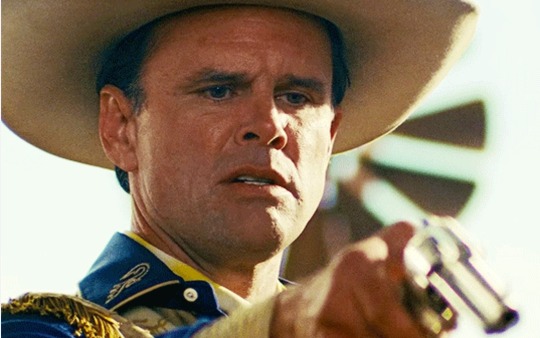

#cooper howard#fallout 2024#fallout tv#my meta#fallout meta#Putting on my baddie costume to go disassociate as I do wicked deeds
129 notes
·
View notes
Text
Theory: Eldred is not Cardan's father
Listen. I don’t know if anyone has said this before, but I’ve been mulling this over for a while now, so I’m going to throw it to the void before The Stolen Heir comes out, for posterity.
Buckle up, folks and Folk. I’m monologuing.

(PLEASE DO NOT INCLUDE TSH SPOILERS IN THE COMMENTS/REBLOGS/TAGS AS I HAVE NOT READ IT, AND WILL NOT BE ABLE TO READ IT UNTIL 8th JAN 2023!)
A big caveat of this theory is that I have basically no solid evidence for this apart from a few faint dots vaguely connected through a strange fog. But I am nothing if not someone who will scrounge around in the dirt for answers. So let’s get some filth under our fingernails.
(I promise it will maybe make sense. Eventually)
I. EPISTOLARY SEMANTICS
Much of this theory centres around the note Jude steals for Dain from Hollow Hall in The Cruel Prince. It reads:
“I know the provenance of the blusher mushroom that you ask after, but what you do with it must not be tied to me. After this, I consider my debt paid. Let my name be stricken from your lips.” (TCP, p.115)
There are so many layers to this note, but I’ll start on the surface level before digging deeper.
When Jude gives the note to Dain, he reads it, then says, “So he’s blackmailing Queen Orlagh” (TCP, p.123). During a first read, one would think Dain is implying that Balekin is blackmailing Orlagh, since Jude stole the note from Balekin’s study, and that Orlagh is the one who wrote the letter to the eldest Greenbriar child.
And no one questions it, because Jude even makes this supposition herself.
But my question is this: Why would Balekin be blackmailing Orlagh? We learn in The Wicked King that they are very much allies, and as far as I’m aware, blackmailing isn’t something you typically do to your allies.
My other question is: Why do we assume that Orlagh is the one that wrote the letter? Because Dain said so? We know him to be unreliable at best, manipulator at worst.
During a second read, one might realise that Dain is in fact being tricky here. He knows exactly who and what this note is referring to. But he’s deliberately trying to lead the Court of Shadows to the wrong conclusion, because the right one would reveal his guilt, as shown in the latter part of The Cruel Prince when Jude figures out Dain poisoned Liriope with blusher mushroom.
The way Dain is able to lead us off track without lying is through implication alone. This is why he’s not specific about who is blackmailing Orlagh. He just says someone is (a likely statement, considering Orlagh’s title) and that someone might be a man (plausible enough).
Thus, the sentence “He’s blackmailing Orlagh” can still be a perceived truth, and we are only ascribing it to the note because it is the closest context.
But we find out later that Dain’s statement has nothing to do with the note, since the note is about Liriope’s poisoning.
After having read TCP [redacted] times, one might begin to think: Is Orlagh even the sender of this correspondence? And if not, who is? And what does the note mean if we’re giving it a different context/sender?
For this, we have to peruse the parts of the sentences written in the note.
A. “Provenance”
For me, this phrase has always seemed a bit strange when referring to blusher mushrooms.
The word “provenance”, as most people recognise it, is used to describe the place from which a particular thing or subset of things comes from (i.e. the provenance of “Champagne” is Champagne, France, and the provenance of “Iranian rugs” is Iran, etc.).
So when we put it in the context of blusher mushrooms, as the note does, it seems to be saying there is a particular place where one can find blusher mushrooms, and the recipient is trying to acquire them for one reason or another.
But Jude, when first dabbling in mithridatism, describes picking blusher mushroom in the palace gardens (p.148-150, TCP). So if Balekin was planning on acquiring the poison, he needn’t look farther than the palace itself.
Which says, to me, that acquiring blusher mushroom for his own purposes wasn’t the subject of Balekin’s original inquiry, since it is common enough for a seventeen-year-old girl to find on her walk to school.
Additionally, the sender says “the provenance of the blusher mushroom”, when “the provenance of blusher mushroom” would be more grammatically correct if the sender was indeed informing Balekin about where he could get the poison.
Implying that they are referring to a single specific blusher mushroom. Perhaps, the very one which poisoned Liriope.
Which means, “provenance”, as it is used in the note, could be referring to the less common definition: “record of ownership”.
My guess is, Balekin asked the sender of the note if they knew who killed Liriope with blusher mushroom. The sender, wanting to remain cryptic in case the message was intercepted, phrased their confirmation so only the person who knew the full context of the message would be able to understand it.
Leading me to believe the sender may be saying, “I know who owned/used the blusher mushroom that you’re asking about”.
B. “It”
Here’s another tricky thing about English grammar: sometimes the subject that “it” refers to can be a group of things.
We might assume right off the bat that “What you do with it” means “What you do with the blusher mushroom”. But, given the previous specification, our sender might actually just mean “What you do with this information must not be tied back to me.”
Essentially, “Don’t tell anyone I told you this but I know who Liriope’s murderer is.”
C. “Let my name be stricken from your lips.”
To me, this last sentence of the note wreaks of faerie bargain.
The sender mentioned they had a debt to pay Balekin, and after divulging who poisoned Liriope, they would consider that debt paid.
But why not just leave the message at that? They already basically said, “Don’t tell anyone I told you this”, so this sentence seems redundant if not included for an ulterior purpose.
It could be a dramatic sign off. More likely, though, it’s a final clause of some bargain made previous to this message. Such as, “You owe me. Tell me who poisoned Liriope and I’ll never speak your name again.”
Either way, it sounds like the sender does not want to be tied to Balekin in any way (understandable tbh).
***This line is important for later, so remember this.***
~~~
So, after these specifications have been made, the note reads:
“I know who owned/used the blusher mushroom to poison Liriope, but what you do with this information must not be traced back to me. After this, I consider my debt paid. As per our bargain, you’re not to speak of me again.”
II. THE SENDER OF THE LETTER
There are many people who could’ve sent this letter. So let’s narrow it down.
Since the letter is in Balekin’s study, we could surmise that it is something Balekin has written and plans on sending. But Jude describes it as being written in “an elegant, feminine hand” (TCP, p.115).
Which doesn’t necessarily rule Balekin out as the sender, but I’m thinking it is much more likely he is the recipient, and that the sender is a woman.
The sender also knows who killed Liriope, so they probably know why Liriope was poisoned, as well. Meaning, they would have had to have ties to her—whether in proximity or in intimacy.
Oriana mentions in TCP that she and Liriope were close friends. She also tells Jude that she knew about Liriope and Dain’s affair.
However, in this same conversation, Jude asks Oriana if she knew Dain was the one who poisoned Liriope, and this is her response:
“Oriana shakes her head. ‘Not for a long time. It could have been another of Eldred’s lovers. Or Balekin—there were rumours he was the one responsible. I even wondered if it could have been Eldred, if he had poisoned her for dallying with his son. But then Madoc discovered Dain had obtained the blusher mushroom. He insisted I never let Oak be anywhere near the prince.’ ”(TCP, pp. 294-295)
Since faeries cannot lie, the truth must be that Oriana is not the one that knew who poisoned Liriope.
And since the letter is left unsigned, Dain attributes its origins to the Queen of the Undersea.
Here’s why I don’t think Orlagh sent this message:
Orlagh is seen in cahoots with Balekin plenty throughout the series. Yet, the sender of this message implies they want nothing to do with the eldest prince, and furthermore explicitly tells Balekin to never speak their name again. If Orlagh were the sender of this note, we would not have much of the scenes which take place in the Undersea during Jude’s kidnapping in The Wicked King.
Orlagh is the Queen of the Undersea. Why would she know or care about the details of a murder of one of the High King of Elfhame’s lovers?
Orlagh also has no ties to Liriope, or Dain for that matter, so why would Balekin go to Orlagh for information regarding Liriope’s murder?
But do you know who does have ties to Liriope, who might also have reason not to want Balekin to speak their name ever again?
Lady Asha.
So how exactly does Lady Asha have ties to Liriope?
It is common knowledge that they were both lovers of the High King. Asha could’ve known of Liriope’s affair with Dain because of their proximity at court. She was also known for being a lover of gossip and secrets. It’s not too surprising that she might know of Liriope’s secret.
But how does Lady Asha know that Dain specifically poisoned Liriope? And why might she want to sever her ties with Balekin?
Let me back track for a moment.
III. EMERALDS FOR HEIRS?
In the prologue of The Queen of Nothing, Lady Asha receives a heavy necklace of emeralds for her “contribution to the Greenbriar line”.
In The Cruel Prince, when Jude is dressing in Liriope’s clothes for the party at Locke’s estate, Locke offers her his mother’s jewels, specifically a heavy necklace made of emeralds (TCP, p. 168).
At first, when I noticed this connection, I thought emeralds must be Eldred’s standard gift given to any mother who births a Greenbriar heir.
But if you recall, Locke wasn’t born to Eldred, and Liriope would have had to receive the necklace while she was still alive, meaning Oak had not yet been born.
It is significant that both of these women have necklaces of emeralds, for the meaning of emeralds—amongst loyalty, love, and strength—is truth.
“A revealer of truths, emerald reputedly could cut through all illusions and spells, including the truth or falsity of a lover’s oath.” (International Gem Society)
Indeed, it’s curious that the only other person known to possess a string of emeralds similar to the one Lady Asha receives in QON, is Liriope.
Liriope, who, to common knowledge, never had a royal child with the High King. Liriope, who, through the events of TCP, we know to have been having an affair with Dain while still in the High King’s favour.
Liriope, who, like Lady Asha, met an unfortunate fate.
If emeralds represent the falsity of a lover’s oath, and Liriope possessed such a necklace before her passing, it could be that the emeralds Asha received were less a gift as much as they were a warning.
One that Asha was either too arrogant or too oblivious to figure out when she first received them, but that she might've pieces together after Liriope's death.
IV. PUNISHMENT BY PROXY
In the prologue of Queen of Nothing, the narrator informs us that Cardan’s punishment for “killing” a mortal man was that his mother was locked in the Tower of Forgetting.
It’s unsurprising that a mother should shoulder the blame for the crimes of her royal son, but this seems like a steep price to pay for the death of someone only tangentially related to the High King’s concerns.
It wasn’t even a lover of Eldred’s own who was killed. It was the lover of his lover/seneschal.
Incarcerating Asha because her son allegedly killed the lover of the High King’s lover feels like an overreaction. Why not simply cast Asha from the court? Or send her to the mortal lands?
Unless…
The High King suspected (or knew) that Lady Asha had committed some other serious offense against him, but had no sufficient evidence to lock her away. Or perhaps he did not want to risk the humiliation that would ensue if everyone at court found out that Lady Asha had been dallying with his son at the same time as she was his own lover.
And, to give her what he thought she deserved without inciting speculation from the court, used the excuse of Cardan killing the mortal to finally serve justice.
Furthermore, we know Cardan and his mother were not close. We know Asha did not raise Cardan as normal mothers do. Why is sending Cardan’s mother to prison a punishment to him?
Other than a small blot on his reputation (upon which, there are many, much larger blots), Asha’s punishment by proxy largely shouldn’t effect Cardan.
It seems as if Cardan’s true punishment was being virtually disowned by his father, and banished from living in the Palace of Elfhame.
Meaning, Asha’s punishment wasn’t really Cardan’s, but her own.
V. THE DEBT
In the letter Jude stole from Balekin’s desk, a “debt”, which has been paid through the information provided, is mentioned. If Asha sent this letter, what debt could she possibly owe Balekin?
Well, for starters, he did raise her son when no one else would.
Though, it’s unclear to me when in the timeline Asha wrote the letter and when she was imprisoned, if this is the aforementioned debt, Asha would’ve had to have written the letter after she’d been sent to the Tower of Forgetting. Because her being sent to the Tower was the catalyst for Balekin raising Cardan.
This debt also begs the question: Why would Balekin offer to raise Cardan?
Surely having Lady Asha, an incarcerated ex-lover of the High King, in his debt isn’t so valuable as the immense responsibility of raising a child he has no obligation to.
Which points to a motive that indicates perhaps Balekin does have an obligation to this child.
When Madoc kills Eva and Justin in the prologue of TCP, he takes Jude and Taryn in, claiming it as his “duty” after he rendered them parentless. We know the fae value their honour, and so even someone as opprobrius as Balekin might be subject to upholding duty in the face of a faerie child’s mother being sent to prison.
But as we know, he did not cause Lady Asha’s detainment (Dain did). So where is this sudden sense of duty coming from? None of the other Greenbriar siblings seemed to have the same moral inclination.
Balekin taking Cardan in could be purely out of selfish motives. Such as, being able to shape Cardan to his will, which he might then use in a potential coup.
But it could be that, through everything, Balekin has an inkling of an idea that Cardan might not be his brother, but his son.
There is another debt which is possible in relation to the letter if it was sent prior to Lady Asha’s imprisonment. But for this, we must consider why Lady Asha would want her name to be stricken from Balekin’s lips in the first place.
The most obvious answer to this which I could think of is that Lady Asha knows she has committed treason by sleeping with Balekin, the High King’s son, and claiming their child as one of the High King’s own, staking her place at court as higher than is deserved, while also playing the High King for a fool.
So the debt could simply be that Lady Asha, seeing what happened to Liriope and knowing what happens to lovers of the High King after being found adulterous, wanted Balekin to never be able to speak of their affair ever again.
Balekin, not being of the sort to do things for other people without a price, might have said that he’d agree to this if she offered him information that he wanted. After she gave it to him, their bargain would be complete, and Balekin would henceforth never be able to speak Lady Asha’s name.
Regardless of which debt is the truth, indeed, I do believe we do not hear Balekin utter Asha’s name once throughout the course of the series. Despite the fact that it is almost certain they knew each other before.
VI. PRIOR ENTANGLEMENT
How do we know that Asha and Balekin knew each other well enough to be sending letters like this back and forth to each other, if we are not yet certain that they had an affair?
In the prologue of TCP, Madoc states that he didn’t believe it when Balekin told him his wife and child were not dead, but living in the mortal world. This indicates that Balekin had knowledge of how Eva faked her death.
Now, we could owe this to the presence of spies at court. It’s likely that Balekin has his own hoard of spies, as do most of the prominent figures in Eflhame.
Or we could consider that perhaps Lady Asha, who is the other person confirmed to have known that Eva faked her death (TWK, p.129), was Balekin’s informant on this matter.
After receiving this information, he was then able to pass it on to Madoc in order to gain his trust (with the ulterior motive that Madoc might trust him enough to help him with his coup).
But then, we must also consider why Lady Asha would tell the eldest prince of her friend’s plan in the first place.
One thought I had was that perhaps Balekin, having a slew of mortal servants under his roof, was the person who offered Eva the unidentifiable mortals left in Madoc’s house as “proof” of their death.
He’d have to have motive to do this, however. Which indicates he either had some sort of attachment to Asha, who was trying to help her friend escape Faerie, or Balekin valued the knowledge of their plan enough to help them carry it out.
Another less complicated motive for Lady Asha telling Balekin of Eva’s escape would be that Asha and Balekin had a history of being in cahoots with one another, which would point to a connection deeper than a passing acquaintanceship due to proximity at court.
VII. AN UNCANNY LIKENESS
It is a truth in The Folk of the Air series that children look very much like their biological parents.
Oak, biological son of Dain, looks an awful lot like Dain:
Oak is described as having deer legs, little horns on his head, and brown hair with streaks of gold.
Dain, in turn, is described as having deer legs, little horns, and golden curls.
This striking resemblance is what initially got me thinking on Cardan’s parentage. And it is further backed by the many other child-parent resemblances in the series:
Vivi is described as having inherited her father’s golden cat eyes and fur-tipped ears.
Locke has obviously inherited his mother’s “sunrise hair”.
And it could be argued that Oak inherited Liriope’s “starlit eyes”, as his are an amber-gold colour that might resemble an old star.
Lady Asha even states that Jude resembles both Eva and Justin greatly (TCP, p.129).
And in kind, Jude thinks that Lady Asha and Cardan look very alike, though she does not admit to this out loud.
These likenesses do not necessarily indicate anything other than a pattern, which could be total coincidence. But it does mean that we could reasonably conclude that faeries, as with humans, often take on characteristics of their parents.
Balekin is described as having black hair, pale skin, and silver eyes.
Cardan’s description in the series is quite similar:
He is said to have black curls, pale skin, and metallic-rimmed black irises.
When we compare that to Eldred’s description—golden hair and bronze owl-like eyes—it doesn’t seem like Cardan inherited many traits from the High King at all.
Now, this could be because Lady Asha’s characteristics were more dominant in Cardan’s inherited genes.
She is described as being pale, with raven hair, and black eyes. She also clearly passed her tail on to her son.
But the similarities between Cardan and Balekin go beyond the obvious. When Jude is hiding under a chair in Balekin’s study, she notices the following:
“In two strides, Balekin is in front of his brother. They look so alike standing close. Same inky hair, matching sneers, devouring eyes.” (TCP, p.119)
Indeed, this resemblance is echoed across the series. In The Wicked King, when Jude goes to visit Balekin in the Tower of Forgetting, she states:
“As I ascend, I glance back at Balekin’s face, severe in the green torchlight. He resembles Cardan too much for my comfort.” (TWK, p. 26)
And again, in the Undersea, when Balekin comes to interrogate her, Jude thinks:
“They have the same black hair. The same cheekbones.” (TWK, p. 240)
There is also the matter of Cardan’s name, which bears resemblance to Balekin’s physicality.
Balekin is described as having thorns on his forearms. Cardan is a name which is derived from Cardon, which means thistle. Thistles are a prickly flower that grow from stems of thorns.
We know Holly Black is very intentional with her descriptions and words. My question is, why would she go out of her way to draw these physical comparisons, to echo the sentiment that the two are strikingly similar, if Cardan and Balekin were merely brothers?
She could have said that Cardan, being raised in Balekin's household for much of his formative years, was moulded to adopt his brother's mannerisms and propensity for cruelty. She could have said the way that they talk, walk, carry themselves, etc. were extremely reminiscent of one another, and we as readers would've gotten the point: that Jude thinks Cardan and Balekin are alike in many ways.
But this isn't what Holly Black does. Which leads me to believe there is something else to the constant parallels she chooses to include.
VIII. IN CONCLUSION
I’m aware this entire post reads like a conspiracy theory. So to those of you who stuck it out this far, congratulations and welcome to the circus.

I’ll be the first to admit that it is a big reach to say that this is fact rather than the speculation that it is. There are a lot of holes, which I can only hope might be filled in the coming duology.
That being said, this theory brings many questions to light.
How would Balekin know of Eva’s escape without having a more intimate relationship with her friend than previously thought?
Why would Lady Asha want her name stricken from Balekin’s lips so desperately as to make a bargain with him?
How could Lady Asha possibly be indebted to Balekin?
Why would Liriope and Asha be the only two characters with heavy necklaces of emeralds on their person if it didn’t mean they shared a similar history with the High King?
Why would Holly Black continuously compare Balekin and Cardan, indirectly pointing out that neither look much like their father or other siblings, but look undeniably like each other, if not to draw a deeper connection between the two?
And finally, and perhaps most importantly, if Lady Asha’s dalliance with Eldred was so brief—as is confirmed by Oriana in chapter 12 of QON— how did she come to be pregnant by him? We know faerie menstrual cycles don’t happen as often as mortals’.
Is this as simple as good luck, or does it speak to an affair no one knew was happening?
–Em 🖤🗡
more theories & analysis
#this is. complete speculation ngl gvskdjsk#i have a whole conspiracy theory red string board for this one though#tfota#jurdan#cardan greenbriar#jude duarte#balekin greenbriar#lady asha#the folk of the air#jurdannet#the cruel prince#the wicked king#the queen of nothing#queen of nothing#holly black#judecardan#how the king of elfhame learned to hate stories#tfota meta#tfota analysis#my analysis
858 notes
·
View notes
Text
I’ll speak more on the season finale of “The Last of Us” later, but for now, I just wanna say that I felt that the episode brought back the sense of dread in a shootout scene. I feel that audiences, including myself, have gotten so desensitized to gunfights in movies and TV shows that when we’re watching these scenes happen, we’re not registering just how destructive they really are. For example, if you watch any of the “John Wick” movies, by the 70th person who John has gunned down, you’ve essentially become numb to all the deaths. They’re no longer people, they’re just targets.
But the way “The Last of Us” filmed the hospital scene really emphasized just how horrific the massacre was. Heroic music isn’t playing, close-ups on Joel’s victims, Joel shoots a guy who surrendered, Joel’s numb expression, unarmed people running away and pleading for their lives. Even though Joel is the hero, the show doesn’t sugarcoat how destructive his actions were.
Honestly, the last time a shootout scene gave me this sense of dread was “Daredevil” when Frank Castle shot up the hospital…oh, what a coincidence!
#joel the last of us#the last of us#tlou#tlou spoilers#hbo the last of us#hbo tlou#tlou hbo#pedro pascal#joel miller meta#joel miller#ellie williams#tlou marlene#jerry anderson#naughty dog#daredevil#frank castle#the punisher#john wick
398 notes
·
View notes
Text
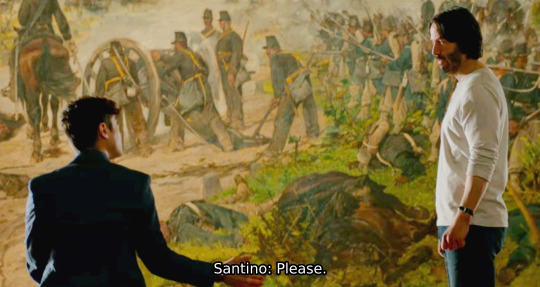
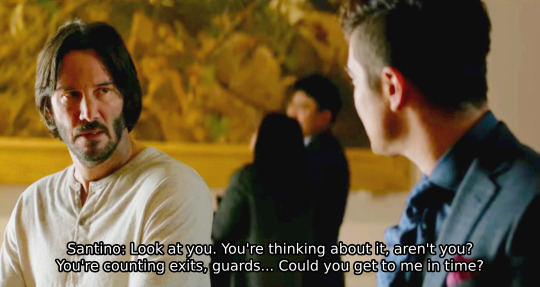
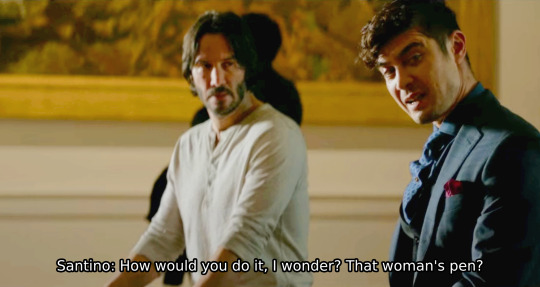
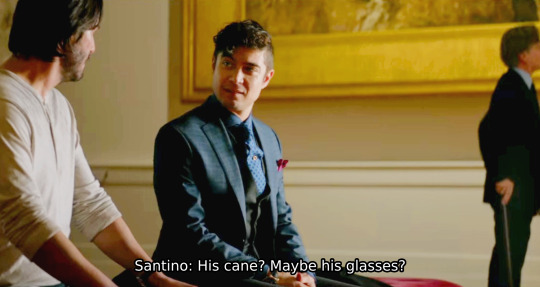
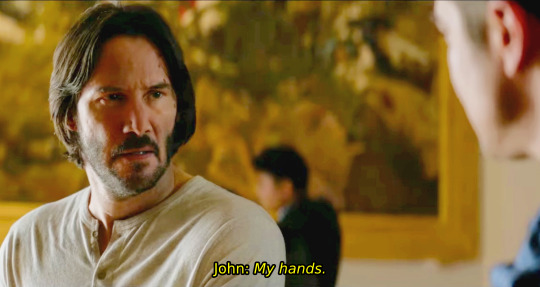


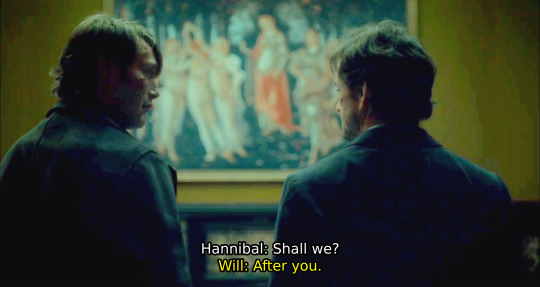

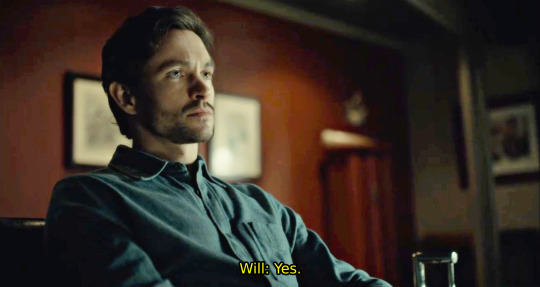
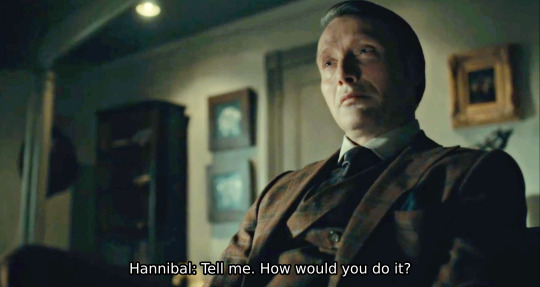

John Wick: Chapter 2 | Hannibal
#santino/hannibal are too homoerotic + happy about the convo#john wick#santino d’antonio#hannibal#hannibal lecter#will graham#hannigram#nbc hannibal#hannibal nbc#hannibal meta#hannibal shitpost#murder husbands#meta#dolce#su-zakana
88 notes
·
View notes
Text
Portable People
Muriel: "Can I...Can I take a book with me? I was looking at one earlier. They're like people, only portable." S2E6
Crowley's yeeting them around while stress-cleaning the bookshop, Jimbriel is trying to sell them to the investigating archangels, and Muriel just wants to read them all. Should we give a second thought to any of these books?

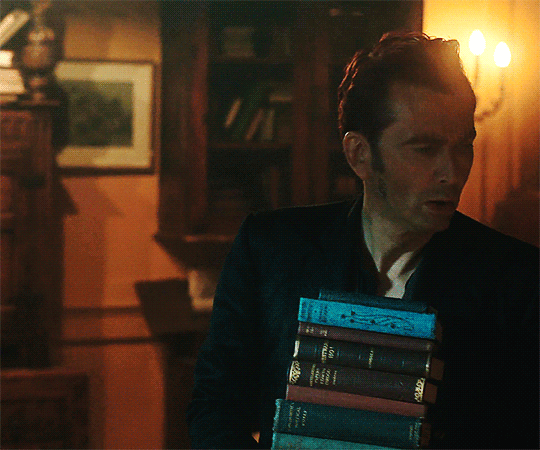
Er, yes. Yes, we should, I say.
In Crowley's case, both times he tosses the books aside (both in S2E3) it is adjacent to a conversation about memory.
In the first one he remarks to Jim that he doesn't remember why "they" invented gravity. He tosses the books - records of the past, records of (human) knowledge - then moves right back into the present, observing Rodney the Stunt Fly with Jim and then describing his Operation Lovebirds plan to him.
The same with the second GIF - Crowley has to make a decision between answering the phone (which is Aziraphale calling from Edinburgh) or the books. The present wins again, and he has the phone conversation with Aziraphale.
Crowley: Pffft. Humans. You don't let yourself get too attached.
Aziraphale: No. No, I suppose not. Um… You haven't actually been selling any of the books, have you?
While we get the impression of Crowley not wanting to hang on to the past, as if its something that's hurt him before and he doesn't want to repeat that, on the other hand Aziraphale was having a lovely time remembering Mr Dalrymple the Scottish surgeon from 1826. This from an angel who hates getting rid of memories books, and we learn keeps a diary! Hmm.
I suppose the question is, is it a real memory problem on Crowley's side or an affected one to get around certain...awkwardness to do with his history? Such as not remembering working with Saraqael or fighting next to Furfur before the Fall?
Jimbriel, on the other hand, is more like Muriel. He is having a wonderful time discovering the delights of Humanity in the bookshop for the first time and is sooo excited to show it to the archangels when they arrive on Aziraphale's doorstep!
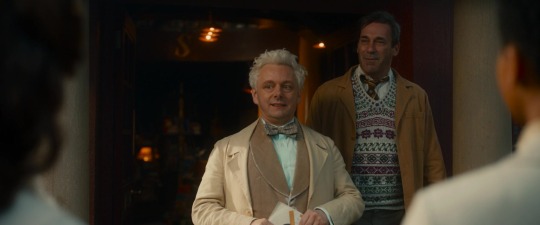
[btw, do you notice which side Jimbriel is standing on here? Its actually interesting to pay attention to which shoulder-side he is on in S2, because he is rarely on the left - even in S1, as well]
So while Aziraphale tries to, um, explain what humans do, Jimbriel "fans" one in Saraqael's face and then tries to (horror!) kill Rodney the Stunt fly with the Wicked Bible - the one with the printing error that says "You Shall Commit Adultery." *ahem* (not looking at you Jimbriel, oh no, not all...) Good thing it never works, Jimbriel declares, as the dust flies dramatically.
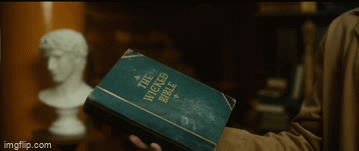
Edit: This book-banging episode is also a Monty Python reference! I found out over in my Assistant Bookseller meta that Jim's Fair Isle's style vest is a nod the Gumby characters, who all wear that style of vest and have the catchphrase "My brain hurts!" They also bang bricks together occasionally. *sigh* The things you didn't expect to find...Gabriel the Gumby...
The angels take no notice of Jim's antics. Since when do they take any notice of what goes on with humans, anyway? Oh, yes, they are going to keep a close eye on Aziraphale, but some idiotic human - nah! Don't care!
Then there's this travesty:
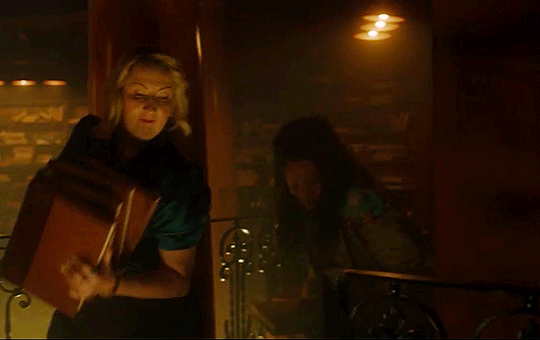
Aaah! The horror! Aziraphale reluctantly lets Maggie and Nina throw the books of human knowledge at the demons. But that doesn't work in the long run. Only the angel himself can solve this crisis.
#good omens#good omens 2#good omens meta#crowley#aziraphale#gabriel#muriel#the book shop#mr dalrymple#edinburgh#portable people#Rodney the Stunt Fly#the wicked bible#Is that Jim's fans only section?#the horror!#no no that's about the encyclopedias#foul fiends!#how dare you defile a book!#Monty Python#gumbys
103 notes
·
View notes
Text
today I'm thinking about "I blame myself for what you've become"
#merlin and morgana#I've just finished reading that long meta post#I don't agree that morgana turning evil was merlin's fault#she made her own choices#but. he certainly tipped the scales#and he wasn't portrayed as entirely blameless in the show#at least insofar that “coming out” to morgana might have prevented her descent into evil#maybe. possibly.#but there's no way of knowing that#anyway#the point that said The Wicked Way is the last episode in which Merlin fights for his rights (!!)#I don't entirely agree there either bc of ep 5x10#but it's true he lost the will to fight for his freedom after that :(#omg that's so sad#ramblings#*
161 notes
·
View notes
Text
Madoc is such a fascinating character to me.
Like, this is a guy who really, truly cares about family. Not even in the warrior sense of family honour or loyalty— although that too— but in the most like, cereal-packet, Saturday Morning Cartoon way possible.
On some level Madoc's main goal in life is to come home every evening to a well-cared for, loving stay-at-home wife, and a gaggle of well-behaved, happy children.
It's just that his other main goal in life is unending war and bloodshed, and he seems to be incapable of understanding why those things don't mesh.
Dude has two wives and four kids (that we know of). He loves/loved all of them deeply. He murdered one and almost succeeded in murdering another. Two of them ended up having to be hidden from him in the mortal world for their own safety. Three of them have faced him in direct combat. Literally all of them have at some point either conspired against him or aided somebody else in conspiring against him.
Madoc literally murdered Jude, Taryn and Vivi's parents in front of them. And then took them in and started acting as their new Dad.
He mortally wounded Jude and then asked to be allowed to help her.
He basically tried to invade Elfhame, laid out a plan to establish Jude as a puppet-queen (and we don't know that he didn't know the true secret of the Bridle) and then said that it would be “good to be a family again”.
We're told repeatedly, by Jude, that Red Caps need to shed blood, but we're never really told exactly what this means. The fact that Jude doesn't have any qualms about banning Madoc from using weapons suggests that he probably isn't going to actually die if he doesn't meet his Blood Quota for the century.
Is it an addiction? An instinct? A spiritual obligation? Just something he really, really likes and doesn't want to give up?
Is all the fucked up stuff Madoc does on his path to the throne really just his Red Cap instincts getting the better of him?
Or is it just that we're getting all this from the POV of his daughter, who needs some way to explain in her mind the separation between 'Madoc her Dad' and 'Madoc the General-Turned-Traitor'?
Regardless of how in-control of it he actually is, Madoc's Red Cap status is fundamentally treated by everyone around him as a blank-check for him to be as bloodthirsty as he likes. Even when Jude is actively working against him, she still takes time to clarify, in her internal monologue, that this is just Madoc's nature, that he can't be anything else.
But how much of an issue is it really? Is Madoc incapable of having the family he wants because he's a Red Cap, and Red Caps are incapable of anything other than violence, or because he's a Red Cap, and thus assumes he's exempt from having to make the choice between 'family-man' and 'gore-soaked warlord'?
Is banning him from ever picking up a weapon a punishment because to stop killing people is somehow inherently detrimental to Red Caps? Or because if he survives doing so then it proves that he could have stopped at any time, and thus that everything he's done so far was the result of his own, personal choices?
What would these stories look like from his perspective?
#madoc#folk of the air#fota#holly black#jude duarte#fota meta#meta#folk of the air meta#the cruel prince#the wicked king#queen of nothing
107 notes
·
View notes
Text
Blueming
I finally got around to watching Blueming. Full disclosure, I read the webcomic before and I really enjoyed "Who Can Define Popularity?". It's cheesy, over the top, and really fun.
Blueming, on the other hand, with its muted colors and more down to earth story somehow manages to cover most of the webcomic's events and maintain a lot of the personality of the characters without capturing the energy of the webcomic at all.
While I wouldn't call Blueming an adaption in name only, the changes made significantly alter in a meaningful way. It takes the aspects of "Who Can Define Popularity?" and builds its own story. That story is very clearly informed by its source material but it's a very heavy modification.
I understand that why they adjustments they made. A lot of it definitely had to do with the run time they had and part of it was probably to story translate better to live action.
In considering this, I am still disappointed with the direction they went with Cha Siwon's motivation. Originally in the webcomic, Siwon was largely self-motivated. His complex was shaped around a childhood where he was made fun of for being chubby but his motivation to lose weight and determination to save face was largely just him.
Having it be in part, his single mother pushing him to lose weight to save face — that changes the way I see Siwon pretty significantly. He goes from his character cares a little too much about appearances to somehow who was forced to care by his mother. It makes an internal motivation makes it an external pressure.
I get why they did this -- this gives Blueming a more traditional film structure. It's a shorthand to add depth to a character and flesh out his complex. I'm just disappointed they pinned his insecurities on his single parent household.
In the comic, it's largely that Cha Siwon as a person has a personality that is shaped by insecurity, that cares too much about how he is perceived, and that he has a pride he wants to protect. It also parallels really well with Hyung Daun. They're both shaped by their environment and outside factors yes. Really their issue is that they care too much about how others perceive them.
I don't think Blueming is bad. It manages to tell the story it wants to tell surprisingly well with its run time. I just think it's better enjoyed when you don't think of it as an adaption of "Who Can Define Popularity?". As I said, the webcomic is cheesy and over the top. It’s a melodramatic comedy. The tone of both stories is entirely different even if they cover the similar ideas.
6 notes
·
View notes
Text
do y'all ever think about how elphaba saw glinda being sad and tried to cheer her up by inviting her to the emerald city and how elphaba wanted glinda to come with her during defying gravity and how elphaba didn't want glinda to clear her name because the people would turn against her and how elphaba's last spoken dialogue is about wanting glinda to know she's alive and
825 notes
·
View notes
Text
I absolutely love bojack horseman I love that Diane and bojack literally are the same except Diane could never get as low as bojack because bojack is a man and has a power over other people (particularly over women) that Diane has never had so even though they are both damaged in a similar way Diane isn't a manipulative sex pest and that's literally the biggest difference between failwomen and failmen. that's real life
#my posts#i understand why people wouldnt want to watch a show about a sleazy shitbag of a horse-man#but i think it is so real and on point about how men treat women and especially how rich men treat women and WHY#and its so meta too. like it is wicked meta about how shows that star abusive male leads end up validating toxic behavior#but its not like rick and morty or south park where there are little to no consequences for shitty behavior. the consequences are very real#consequences: the show#i love it. i love to see a horse man get shit on for 6 seasons
60 notes
·
View notes
Text
Season 2, Episode 2, about 15 minutes in.
Gabriel uses two thick books to try to squish the fly buzzing around, and Aziraphale lets out this strangled cry of distress.
I thought it was just due to the fact that Michael, Uriel, and Saraqael were interrogating Aziraphale and the situation was tense, and our little bookworm of an angel didn't want Gabriel drawing attention to himself.
I'm sure that was part of it, but I think Aziraphale was mostly reacting to the fact that Gabriel went scurrying all around to choose the perfect book for the job and THIS IS THE BOOK HE CHOSE.
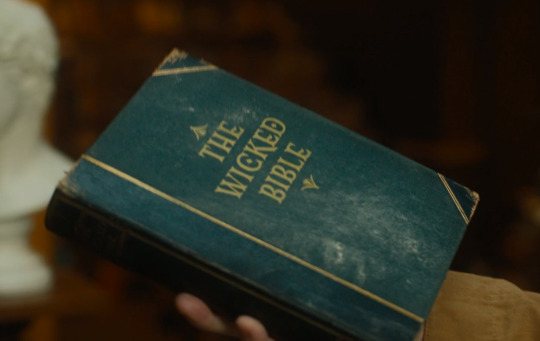
I'm sure Aziraphale was screaming internally, "NO NOT ONE OF MY PRICELESS BOOKS PUT IT DOWN YOU BRUTE OH GOD GABRIEL IS TOUCHING THE BIBLE OF SIN DON'T LET THE ARCHANGELS SEE I HAVE THAT NNNNGK."
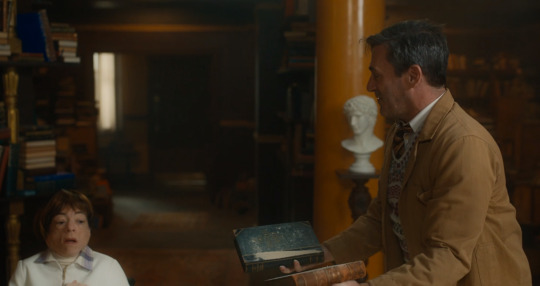
I also like that Saraqael is wearing a purple tartan collar to visit Earth.
Tartan is stylish!
#good omens#ancient tomes are not fly swatters#jimbriel what are you doing JIMBRIEL STOP#Crowley would have cackled#seriously Aziraphale you need to dust your shop more often#wicked bible#aziraphale#archangel fucking gabriel#archangel michael#archangel uriel#saraqael#good omens meta#good omens fandom
48 notes
·
View notes
Text
The Wicked Bible
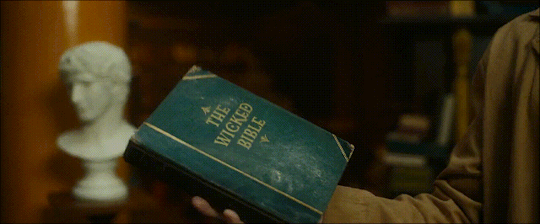
Got its name from the omission of the word “not” from the seventh commandment making it read
“Thou shalt commit adultery”
Which season one has a fun little play on this with ‘Thou shalt not commit adultery Pulsifer’ being called Adultery Pulsifer
but that is not the only error reported to have been in this bible
In the book of Deuteronomy (which is concerning Moses) the word “greatness” was altered to appear as “great-asse” making the sentence read
“Behold, the Lord our God hath shewed us his glory and his great-asse.”
but for some additional context during this time the word “asse” was used in the context of meaning “donkey”

#that’s it#just something I found interesting#do I have a random thought that Gabriel could be paralleling Moses#yeah#have I actually looked into that further?#nope#maybe one day#good omens#good omens 2#good omens meta#the dirty donkey#the wicked bible#good omens gabriel
28 notes
·
View notes